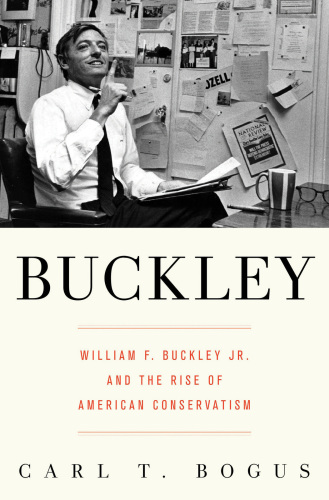
Buckley
William F. Buckley Jr. and the Rise of American Conservatism
کتاب های مرتبط
- اطلاعات
- نقد و بررسی
- دیدگاه کاربران
نقد و بررسی

September 12, 2011
This thoughtful blend of biography and intellectual history harks back to a time when conservatism was dominated by proud and profound intellectualism. When William F. Buckley (1925–2008) launched the National Review in 1955, mainstream “conservatism was not merely out of favor,” but denigrated by Democrats and many Republicans as well. With Ronald Reagan’s election in 1980 and the country’s fundamental shift to the right, “the modern conservative movement finally reached the political mountaintop,” in large part thanks to Buckley’s re-articulation of the conservative agenda. Bogus (Why Lawsuits Are Good for America) charts Buckley’s ascent—the moneyed outsider who couched his blistering critique of the Eastern liberal establishment in peerless prose (“a sharp sword in a velvet scabbard”)—and his critical interventions in bringing the GOP back from the brink, for example, he was instrumental in marginalizing such fringe elements as the John Birch Society. (Bogus is markedly less admiring of Buckley’s early and strenuous opposition to the civil rights movement.) The final third of the book wobbles a bit, with summations of the cold war and the Vietnam War and a focus on lesser lights at the National Review. But despite disagreements with much of his subject’s political philosophy, Bogus vividly encapsulates how radically Buckley “changed America’s political realities... a feat so great that it is almost impossible to overstate.”

August 15, 2011
A professed liberal's assessment of the rise, reign and enduring legacy of William F. Buckley (1925–2008), the godfather of the modern conservative movement.
Bogus (Law/Roger Williams Univ.; Why Lawsuits are Good for America: Disciplined Democracy, Big Business, and the Common Law, 2001, etc.) offers not a traditional cradle-to-grave biography but an ongoing conversation about and argument with Buckley—with long (often overlong) asides explaining the historical contexts of events involving his subject. The author admires Buckley as profoundly as he disagrees with him. He praises him throughout for his humor, prolificacy, energy, writing, debating and managerial skills and devotion to his family and causes. But for Buckley's principal ideas, which, Bogus writes repeatedly, came directly from his father, he has much disagreement and even disdain. Nonetheless, he recognizes that Buckley changed American history, "a feat so great that it is almost impossible to overstate." Bogus writes about Buckley's influence on Ronald Reagan, Karl Rove, Rush Limbaugh and numerous others, and he shows how Buckley assembled a team that propelled National Review into a position of influence. The author revisits Buckley's father's involvement in the Mexican Revolution (he met Pancho Villa), swiftly summarizes Buckley's education, his early writings and his efforts to avoid combat in World War II and Korea. He establishes the primacy of religion in Buckley's weltanschauung and chronicles his awkward, tone-deaf writing about civil rights, his symbolic run for mayor of New York, his advocacy of wars in Vietnam and elsewhere and his moves to distance NR from the Birchers and other extremists.
A disagreeing but rarely disagreeable argument with a figure far easier to debate on the page than in person.
(COPYRIGHT (2011) KIRKUS REVIEWS/NIELSEN BUSINESS MEDIA, INC. ALL RIGHTS RESERVED.)

Starred review from September 15, 2011
The erudite and entertaining provocateur William F. Buckley was a founding father of modern conservatism. Bogus (law, Roger Williams Univ.; Why Lawsuits Are Good for America) hasn't written a straight biography but circles his subject as he tells the story of the conservative movement's origins. Despite the handicaps of being both a lawyer and an academic, Bogus is a first-rate writer. He clearly and fairly explains the competing philosophies of different conservative sects--Burkean conservatism, libertarianism, Ayn Rand's objectivism. His penned portraits of Whittaker Chambers, William F. Buckley Sr., Russell Kirk, and others are sharp and revealing. He has a deep conversance with the material, yet he wears his knowledge lightly. The entire book is lucid and flows beautifully. The only flaw: Bogus sometimes loses focus explaining background material--yet those tangents are done so well they are worthwhile diversions. VERDICT This is an insightful book that will please anyone interested in midcentury American history and politics. Anyone serious about political philosophy will learn from it. Highly recommended.--Michael O. Eshleman, Kings Mills, OH
Copyright 2011 Library Journal, LLC Used with permission.

























دیدگاه کاربران